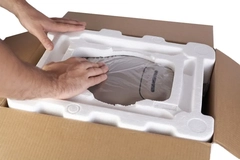APCO and COFOSS collaborate for circular electronics packaging
Key takeaways
- APCO and COFOSS collaborate to address EPS recycling challenges in electronics packaging.
- The partnership aims to create evidence-based recommendations for circular systems.
- APCO’s roadmap supports the phase-out of B2C EPS packaging and expansion of recycling infrastructure.

The Australian Packaging Covenant Organisation (APCO) has partnered with the Coalition for Sustainable Solutions (COFOSS) to design circular systems for expanded polystyrene (EPS) in electronics packaging. APCO will advise on circular design principles while COFOSS will contribute to collection and recovery data on EPS in the electronics sector.
The collaboration aims to bring “scale and focus to the issue of EPS,” which, while a useful material for product protection, is hard to recycle and often leads to environmental contamination.
It aims to develop practical, evidence-based recommendations on the design, governance, and funding of circular systems for electronics packaging.
Chris Foley, CEO at APCO, says: “This is a clear signal that the industry is stepping up to take meaningful action on one of Australia’s most challenging packaging materials. EPS has long been difficult to recycle, and solving it requires a coordinated, evidence-based response.”

It reinforces APCO’s Action Plan for Problematic and Unnecessary Single-Use Plastic Packaging and its Roadmap to Implement the National Phase Out of Business-to-Consumer EPS Packaging, which states APCO’s aim to phase out B2C EPS formats and expand recycling systems.
Industry insights
Moreover, APCO highlights how the collaboration aligns with the objectives of the Australian Government’s National Plastics Plan.
COFOSS chair and managing director for Electrolux Australia and New Zealand, Kurt Hegvold, says: “Our sector plays a vital role in addressing the environmental impacts of packaging. By combining our understanding of product protection and recovery challenges with APCO’s national framework, we can advance viable alternatives and improve recycling outcomes.”
“This is about delivering real outcomes, supporting brands and retailers to meet their responsibilities, reducing waste across supply chains, and ensuring the sector remains part of the solution as Australia transitions to a circular economy.”
In August, the Australian Bioplastics Innovation Hub partnered with Perth-based biotechnology company, Cass Materials, to replace EPS seafood boxes with a fully biodegradable alternative made from wheat straw.
This week, Nexam Chemical and Verdofoam partnered to expand Nexam’s lightweight product portfolio with the development of a bio-based foam using “breakthrough” additive technology.











